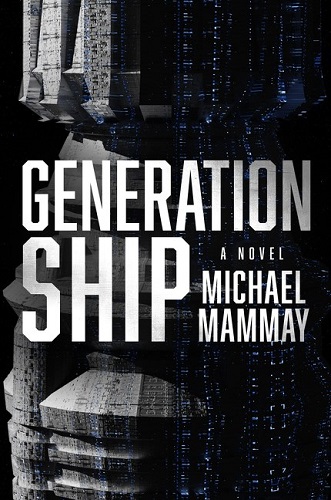 Generation Ship by Michael Mammay
Generation Ship by Michael Mammay Format: eARC
Source: supplied by publisher via Edelweiss
Formats available: paperback, ebook, audiobook
Genres: science fiction, space opera
Pages: 608
Published by Harper Voyager on October 17, 2023
Purchasing Info: Author's Website, Publisher's Website, Amazon, Barnes & Noble, Kobo, Bookshop.org, Better World Books
Goodreads
In this riveting, stand-alone novel from Michael Mammay, author of Planetside, the beginning of a new human colony must face tyrannical leaders, revolution, crippling instability, and an unknown alien planet that could easily destroy them all. In 2108, Colony Ship Voyager departed Earth for the planet of Promissa with 18,000 of the world’s best and brightest on board. 250 years and 27 light years later, an arrival is imminent. But all is not well. The probes that they’ve sent ahead to gather the data needed to establish any kind of settlement aren’t responding, and the information they have received has presented more questions than answers. It’s a time when the entire crew should be coming together to solve the problem, but science officer Sheila Jackson can’t get people to listen. With the finish line in sight, a group of crewmembers want an end to the draconian rules that their forebearers put in place generations before. However, security force officer Mark Rector and his department have different plans. As alliances form and fall, Governor Jared Pantel sees only one way to bring Voyager ’s citizens together and secure his own a full-scale colonization effort. Yet, he may have underestimated the passion of those working for the other side... Meanwhile, a harsh alien planet awaits that might have its own ideas about being colonized. A battle for control brews, and victory for one group could mean death for them all.
My Review:
“Space, the final frontier”…has an awful lot of, well, space, in it. But Star Trek promised that we’d navigate all that space at faster-than-light speed, better known as ‘warp’. Which is probably what FTL will be named if we ever figure out how to do it. Trek history said (says? will say?) that we’ll have it all figured out by 2063 – at least according to Star Trek: First Contact.
But reality is likely otherwise. At least so far as we know now, and seemingly as far as the engineers, designers and builders of the Colony Ship Voyager knew by the time it launched in 2108 – less than a century from our now.
(Albert Einstein’s Special Theory of Relativity implies that FTL travel is impossible for anything that has mass. Meaning humans. And spaceships. Even light is implied to be incapable of traveling faster than the speed of light.)
None of the above prevents humans from either wanting or needing to leave Earth and putting down roots – so to speak – among the stars. Even though the nearest planet we know of, at least so far – is Proxima Centauri b, four light-years away. The nearest likely habitable planet, again, that we know of so far, is Kepler-452b and it would take 1,400 years to get there.
Without FTL travel, space is big and vast and even potential ‘Class-M planets’ (again to use Star Trek terminology because Trek named everything) is too far away from Earth for conventional space travel to work.
The two most often used science fictional methods of interplanetary travel for colonization that work – often badly in fiction – with this dilemma are sleeper ships and colony ships. Generation Ship, as one can tell by the title, is a colony ship.
Colony ship stories have all sorts of dramatic possibilities because, while space may be vast and infinite, the world of the colony ship is relatively small and even claustrophobic – especially over a vast, generations-long, journey to a new home.
Also, humans are gonna human, no matter what circumstances they find themselves in.
Which leads us, by a bit of a roundabout, to the Colony Ship Voyager (Trek again!) on its 250 year journey from Earth to Promissa. A planet which may or may not live up to its promise even as it hoves into sight and reach.
While there’s a philosophical cliché that “It’s not the destination, it’s the journey”, in colony ship stories it’s not the journey, it’s the destination where all the dramatic tension comes into play. The journey, at least after the drama of the launch and the early years of settling in for the long haul, is mostly about keeping on keeping on as everyone adjusts to the new normal.
But the destination, or at least the increasing stress as the destination becomes all too real, represents a time of great change, as the life and routine that the ship has settled into is about to be overset by planetfall. Which may or may not be everything everyone hoped and dreamed way back when the first crew set off on their journey.
And will certainly upset the status quo. Life is going to be vastly different after the ship’s crew become planetary settlers. Whoever it is who has knowledge and power aboard ship may or may not have the skills it takes to be a leader on the ground. Which does not mean that the shipboard leaders aren’t going to do their level and even skullduggery best to remain powerful and privileged.
The story of Generation Ship is all about the jockeying and politicking and outright underhanded dealing that goes on as the Voyager’s probes are able to finally reach the ‘promised land’ and the end of the long journey is about to begin.
Unless, of course, Promissa itself has other ideas.
Escape Rating A++: In spite of the relatively small size of the Colony Ship Voyager, the final months of its long journey to Promissa contain a utterly riveting, terrifically complex and downright huge story that isn’t about the science of colony ships a quarter so much as it is about the political shenanigans of the humans aboard them.
It’s a roiling stew of “we have met the enemy and he is us” coming to a full boil in an atmosphere of “power corrupts and absolute power corrupts absolutely”, especially over time and covered by the slowly eroding illusion of “we’re all in this together” mixed with a heaping helping of “the greater good”.
At the center of the drama are a series of first-person perspectives from all over the ship, from the all-powerful but absolutely not all-knowing governor who is desperate to hang onto his power while cementing his legacy, to the over-ambitious security guard who is just so sure he’s smarter than everyone around him, to the reluctant leader of the not-so-loyal opposition to the scientist whose beloved science is telling her that they are not ready to make planetfall – no matter what the governor has manipulated people into believing. While behind the scenes an ace hacker/engineer sees a truth about their ship that no one is ready to believe or understand.
 By seeing the situation from so many sides we’re able to get inside the life of the ship, AND the life on the ship, which are not nearly as much the same things as everyone believes. We’re watching a world come apart – even if that’s what was always supposed to happen. And it’s utterly fascinating as the players negotiate and maneuver themselves into a situation that is nothing like the first crew expected.
By seeing the situation from so many sides we’re able to get inside the life of the ship, AND the life on the ship, which are not nearly as much the same things as everyone believes. We’re watching a world come apart – even if that’s what was always supposed to happen. And it’s utterly fascinating as the players negotiate and maneuver themselves into a situation that is nothing like the first crew expected.
And it’s absolutely riveting every step of the way, even as it recalls several previous colony ship stories that wrestle with the same issues but take them down to the mat or to the planet in entirely different ways. If Generation Ship sounds fascinating to you, and I sincerely hope it does, you might want to also check out Braking Day by Adam Oyebanji, Medusa Uploaded by Emily Devenport, Mickey7 by Edward Ashton and, last but absolutely not least, the Pixar film WALL-E.

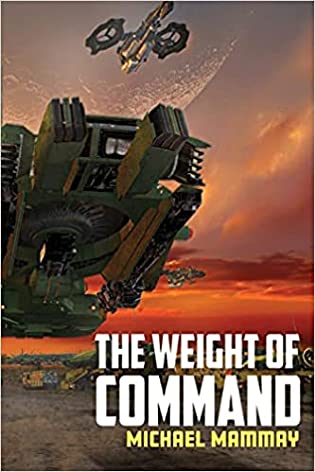 The Weight of Command by
The Weight of Command by  Escape Rating A: This is not exactly the first time this scenario has been done. (There are at least SIX different variations of it in the
Escape Rating A: This is not exactly the first time this scenario has been done. (There are at least SIX different variations of it in the 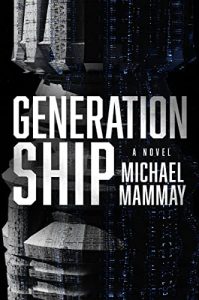 I picked up The Weight of Command because I adored the author’s previous work, especially his
I picked up The Weight of Command because I adored the author’s previous work, especially his 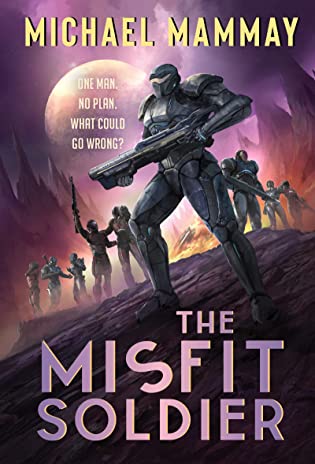 The Misfit Soldier by
The Misfit Soldier by  Colonyside (Planetside, #3) by
Colonyside (Planetside, #3) by  So the mission is kind of Butler’s excuse to get his old “band” back together, but once they’re together they’ve got one hell of a job ahead of them.
So the mission is kind of Butler’s excuse to get his old “band” back together, but once they’re together they’ve got one hell of a job ahead of them.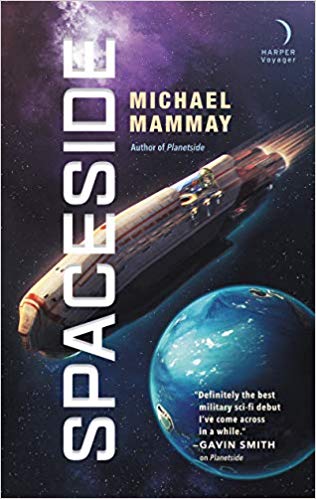 Spaceside (Planetside #2) by
Spaceside (Planetside #2) by 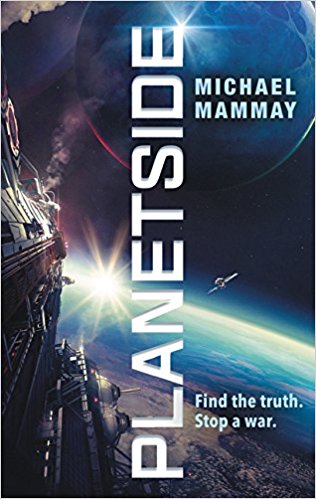 Planetside by
Planetside by